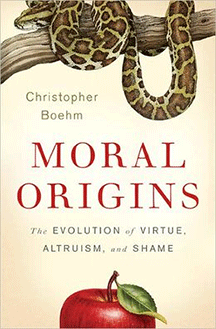By Douglas Candland
Charles Darwin was at once tenuous and careful when suggesting how natural selection could shape animal and human behavior, although his late work (1872) on emotion in human beings and animals established clear models of how to study the evolution of emotions. By observing the insane, actors, his own children, ethnic groups, and domesticated animals, Darwin collected data to augment his own intuitive hypotheses that established how a tidy comparative analysis of the evolution of emotion might proceed.
Prompted by the development of kin-selection theory and sociobiology in the 1970s, anthropology, psychology, and their kin have been of late exploring hypotheses concerning how mental states such as consciousness, conscience, virtue, and morality might have evolved. What these approaches have in common with Darwin’s way of thinking is a reliance on natural selection as the key explanatory principle. They differ in important ways: whether hypotheses are testable by falsification as sound science requires and by extending natural selection far beyond its intended measure of reproductive success into other imaginative kinds of selection.
Using the observations of the cultural anthropology of living groups (e.g., Inuit, Bushmen) coupled with interpretation from the fossil record, author Christopher Boehm offers the reader a somewhat meandering text that describes how conscience evolved from what he calls the Common Ancestor, named Pan, from the LPAs (Late-Pleistocene-appropriate foraging societies) to these present day hunter-gathering societies. The postulation is that as LPA groups grew in size and brains, cooperation in finding food was required, thus conscience evolved, powered by group punishment for some ‘free-riders’ and by an enhanced ‘reputation’ for others who were generous and cooperative. These are regarded as forms of ‘social selection’. The author’s concentration is on “two types of social selection . . . one of which is reputational selection and the other a selection that takes place when groups cracks down on deviants.” Whether ‘social selection’ is group selection is not always clear, leaving the important question of individual as opposed to group selection muddled. It is bothersome that explanations based on individual selection transform themselves by the author’s magic into group selection (and back) without attention to the implications of the choice.
This is not a rigidly argued presentation, but a stroll through ‘what-if’ land. The author’s concept of evidence is loose, but imaginative. The evidence presented comes from analysis of present-day hunter-gatherer groups whose behavior is interpreted backward to suggest how selection—natural, social, sexual, and reputational — perhaps led to present-day patterns of behavior, generally through the evolution of a conscience. The last two chapters both offer a streamlined abstract of the ideas and enlarge the issue to modern U.S. foreign policy and the role of the United Nations.
The work is also an autobiographical memoir, as experiences during the author’s research career either intrude or augment the text, the choice depending on the reader’s temperament. The title misleads, for the text concerns the possible evolution of conscience (not in the subtitle) while virtue and shame (advertised in the subtitle) get little attention and altruism, also so advertized, and identified by Darwin as a problem for his theory, is well-explained at first, but slips from its biological meaning to some broad sociological idea of cultural cooperation.
The reader who enjoys a lively mental stroll that engages the mind, a reader who is also a hunter-gatherer of provocative ideas, tenable or not, will find nutritive red meat, once the fat and gristle are removed.
Douglas Candland (ΦBK, Pomona College, 1956) is the editor of Review of General Psychology and the Homer P.Rainey Professor of Psychology and Animal Behavior, Emeritus at Bucknell University. Bucknell University is home to the Mu of Pennsylvania chapter of Phi Beta Kappa.




